
Hoehyeon Station (Korean: 회현역) is a station on the Seoul Subway Line 4. It is the closest station to the historical gate of Namdaemun, and also serves the major shopping district of Namdaemun Market. This station is located in Namchang-dong, Jung-gu, Seoul.

Sillim Station is a station on Seoul Subway Line 2 and the Sillim Line. It is located in Sillim-dong, Gwanak-gu, Seoul.

Gwanghwamun Station (Korean: 광화문역) is a station on the Seoul Subway Line 5 in South Korea. It is not the closest subway station to the actual gate of Gwanghwamun, which it is named after. It is located next to the U.S. Embassy in Seoul.

Seoul National University Station is a station on Seoul Subway Line 2, located in Bongcheon-dong, Gwanak-gu of southern Seoul. This station is also known as Gwanak-gu Office Station. There are eight exits, two at each corner of the crossroads – of Nambu Beltway (Nambusunhwan-ro) and Gwanak-ro – where the station lies beneath.

Dorimcheon (Korean: 도림천역) is a station on the Sinjeong Branch of the Seoul Subway Line 2. It is the least-used station on Line 2. This station is located in Sindorim-dong, Guro-gu, Seoul.
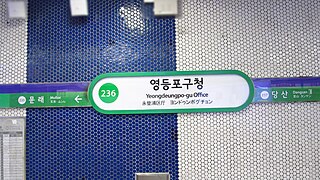
Yeongdeungpo-gu Office station is a station on Seoul Subway Line 2 and Seoul Subway Line 5. Before Mok-dong station on Line 5 was completed, this station served as a link to that neighbourhood via bus.
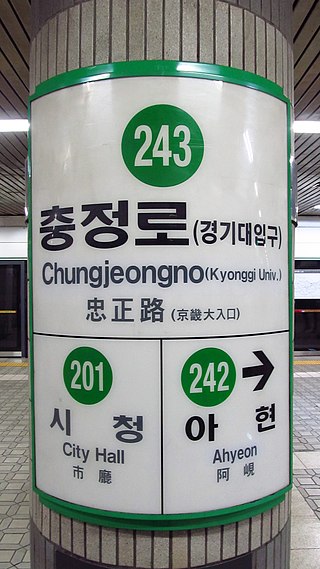
Chungjeongno Station (Korean: 충정로역) is a subway station on Seoul Subway Line 2 and Seoul Subway Line 5. It is located in Seodaemun-gu, which is a district in Seoul, South Korea. Chungjeong was the pen name of minister Min Yeong-hwan, who committed suicide protesting the signing of the Japan–Korea Treaty of 1905.

Noryangjin Station is a metro station in central Seoul, South Korea. The station is located in the Noryangjin-dong (neighborhood) of Dongjak-gu (ward) and is also a stop on Seoul Subway Line 1 and Seoul Subway Line 9. This stop is a popular destination for those seeking to eat raw fish, and other assorted seafood, as a large, covered sea food market is located next to the station, accessible by foot bridge. The Line 1 station is also notable in that Exit 1 and 2 have the same number as Exit 1 and 2 of Line 9's station.

Yeongdeungpo station is a ground-level railway station in Seoul, South Korea. The station is located in Yeongdeungpo Dong, Yeongdeungpo-gu, and is a stop on the Gyeongbu Line, Honam Line and Seoul Subway Line 1. The station is integrated into the Yeongdeungpo Lotte Department Store. Located in the station are Lotteria, Dunkin' Donuts, Krispy Kreme, and KFC.
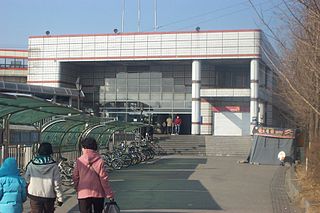
Guil Station (Korean: 구일역) is a subway station in Seoul, South Korea, that serves Seoul Subway Line 1. The name of this station comes from its location within Guro 1 -dong. Dongyang Mirae University is located nearby.

Daerim Station (Korean: 대림역) is a station on the Seoul Subway Line 2 and Line 7. The station is located just south of the Han River in Yeongdeungpo-gu. The Line 2 station is elevated, while the Line 7 station is underground.
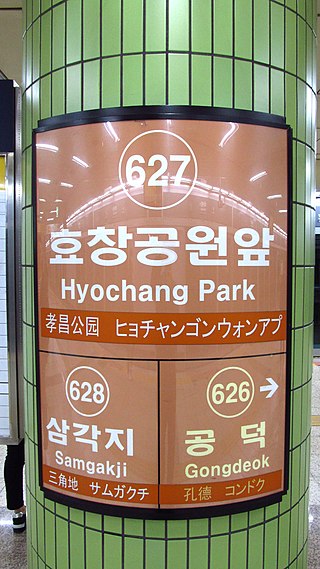
Hyochang Park Station is a subway station on Seoul Subway Line 6 and the Gyeongui–Jungang Line. It is named after Hyochang Park. Nearby is the Hyochang Stadium, a small field capable of hosting sports events. The Yongsan District Office is also nearby.

Onsu Station is a station on the Seoul Subway Line 1. It was the former western terminus of Seoul Subway Line 7. A westward extension of Line 7 was completed in October 2012. It is near the border of Seoul and Bucheon.
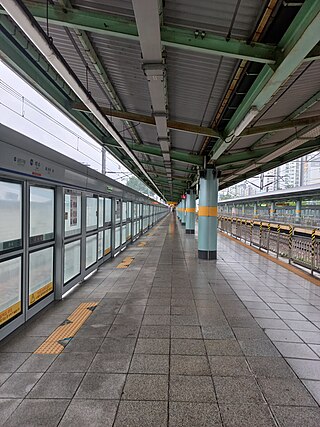
Seoksu Station is a station on Seoul Subway Line 1. It is situated on the border of Seoul and Anyang, the station building itself lying in Anyang, hence the address and indeed its name, which is derived from the area of Anyang in which it is located, and the platforms being in Seoul.

Yeokgok Station is a station on Seoul Subway Line 1 and the Gyeongin Line.
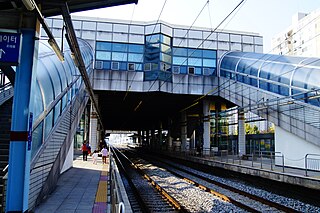
Bugae Station is a subway station located in Bupyeong-gu, a district in Incheon, South Korea. This station is on the Seoul Subway Line 1.
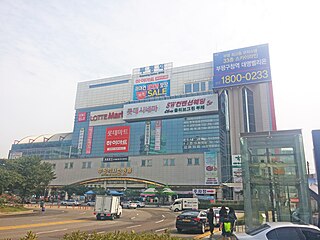
Bupyeong station is a subway station located in Bupyeong District, a district in Incheon, South Korea. This station is on the Seoul Subway Line 1 and Incheon Subway Line 1. It is one of the busiest stations on the Incheon line because of its central location and its connection to the Seoul line.

Oido station is a subway station on Seoul Subway Line 4 and the Suin–Bundang Line in Siheung, South Korea. It is the current southwestern terminus of Seoul Subway Line 4 located almost 30 kilometers southwest of Seoul, connecting Oido to other parts of Korea. A commuter rail trip between this station and Seoul Station takes over an hour, and a train servicing depot is located nearby. The name of the station was decided by the surrounding area Oido island.
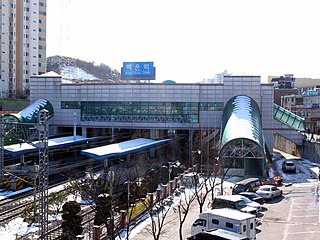
Baegun Station is a subway station on the Seoul Subway Line 1 and the Gyeongin Line.
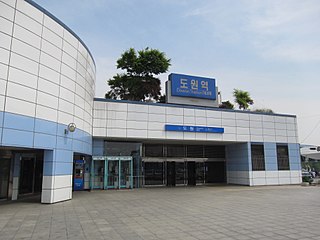
Dowon Station is a station on Seoul Subway Line 1. It is on Gyeongin Line. It was opened in 1899 as Ugakdong Station, which was terminated from service in 1906. The station was reopened in 1994.





















